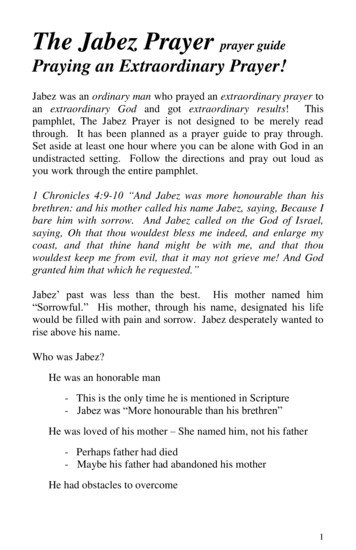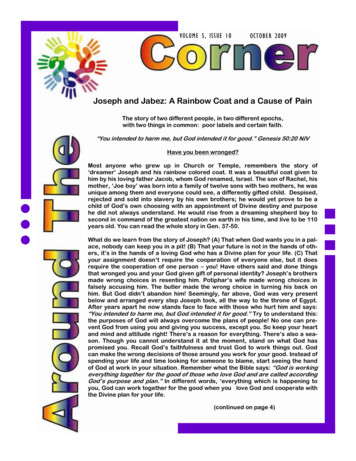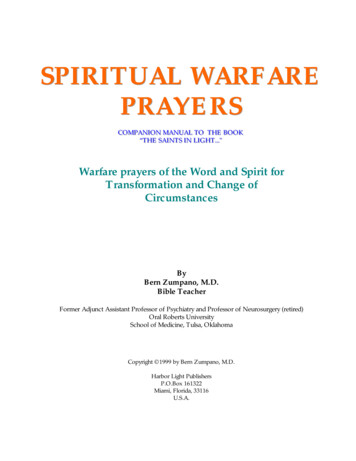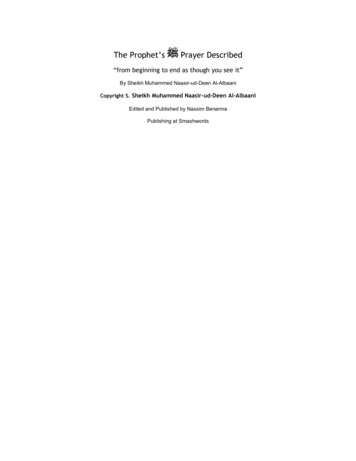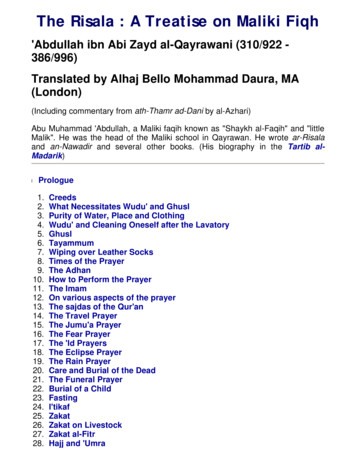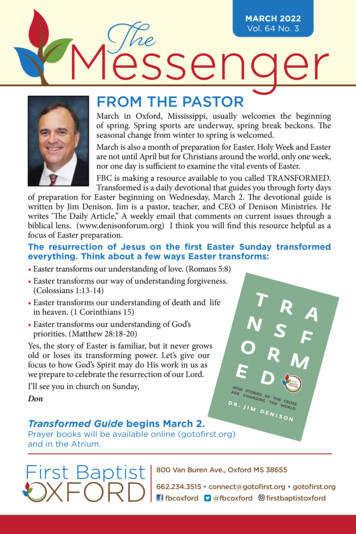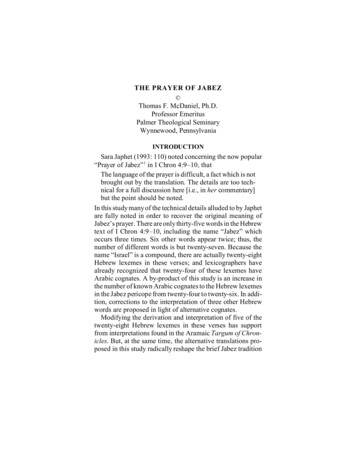
Transcription
THE PRAYER OF JABEZ Thomas F. McDaniel, Ph.D.Professor EmeritusPalmer Theological SeminaryWynnewood, PennsylvaniaINTRODUCTIONSara Japhet (1993: 110) noted concerning the now popular“Prayer of Jabez”1 in I Chron 4:9–10, thatThe language of the prayer is difficult, a fact which is notbrought out by the translation. The details are too technical for a full discussion here [i.e., in her commentary]but the point should be noted.In this study many of the technical details alluded to by Japhetare fully noted in order to recover the original meaning ofJabez’s prayer. There are only thirty-five words in the Hebrewtext of I Chron 4:9–10, including the name “Jabez” whichoccurs three times. Six other words appear twice; thus, thenumber of different words is but twenty-seven. Because thename “Israel” is a compound, there are actually twenty-eightHebrew lexemes in these verses; and lexicographers havealready recognized that twenty-four of these lexemes haveArabic cognates. A by-product of this study is an increase inthe number of known Arabic cognates to the Hebrew lexemesin the Jabez pericope from twenty-four to twenty-six. In addition, corrections to the interpretation of three other Hebrewwords are proposed in light of alternative cognates.Modifying the derivation and interpretation of five of thetwenty-eight Hebrew lexemes in these verses has supportfrom interpretations found in the Aramaic Targum of Chronicles. But, at the same time, the alternative translations proposed in this study radically reshape the brief Jabez tradition
2PRAYER OF JABEZfrom that found in the Targum, Talmud, and contemporaryChristian exegesis. The differences between the Hebrew textin of I Chron 4:9–10 and the Greek, Syriac, and Latin versions are quite conspicuous and require an explanation. Mytranslation of the “Prayer of Jabez” follows the citation of theHebrew text, versions, and the Targum—all of which is introductory to the critical exegesis presented here.I Chronicles 4:9–10wyx 'a,me dB'k.nI #Bêe[.y: yhiy w: bc,[oB. yTid l;y" yKi rmêoale #Be[.y: Amv. ha'r q' Amaiw rmoale laer'f.yI yhel{ale #Be[.y: ar'q.YIw:yliWbG -ta t'yBir hiw ynIker]b'T. %reB'- aiyB ic.[' yTil.bil. h['r'Me t'yfi['w yMêi[i d y" ht'y h'w la'v'- rv,a] tae yhil{a/ abeY"w:New Revised Standard VersionJabez was honored more than his brothers;and his mother named him Jabez, saying,“Because I bore him in pain.”Jabez called on the God of Israel, saying,“Oh that you would bless me and enlarge my border,and that your hand might be with me,and that you would keep me from hurt and harm!”And God granted what he asked.Septuagintkai. h n Igabhj e;n doxoj u p e.r tou.j avd elfou.j auvt ou/kai. h mh, t hr evk a, l esen to. o; n oma auv t ou/ Igabhjle,g ousa e;t ekon w j gabhjkai. evp ekale,s ato Igabhj to.n qeo.n Israhl le,g wn
PRAYER OF JABEZ3ev an. euv l ogw/n euv l ogh,s h j me kai. plhqu, n h j ta. o[ r ia, moukai. h h cei,r sou metV evm ou/kai. poih,s eij gnw/ s in tou/ mh. tapeinw/s ai, mekai. evp h, g agen o qeo. j pa, n ta o[ s a hv t h,s atoThomson’s SeptuagintIgabes indeed was the most honourable of his brethren;Now his mother had called his name Igabes, saying,I have brought him forth Os-gabes [with sorrow].2And Igabes called on the God of Israel and said,If thou wilt bless me with blessings, and enlarge my borders,let Thy hand be with me,and give me knowledge that I may not debase myselfAccordingly God gave him all that he asked.PeshittaH#) L w yhWb) L RIOi NwH[# D{ )whwAiR# K RB] W RB# .Y[I h ? )RowK hDi) )wh w K#W} A\%]wKb l &] AL d A&Ib N# KoRF]whL [) lA?d A! Kl L ]wLamsa’s Peshitta (modified)And one of them was dear to his father and to his mother,so they called his name My Eye. And they said to him,The Lord shall surely bless you and enlarge your territory, and his hand shall be with you and shall deliver youfrom evil, that it may not have power over you, and heshall grant you that which you request of him.VulgateFuit autem Iabes inclitus prae fratribus suis et matereius vocavit nomen illius Iabes dicens quia peperi eum in
4PRAYER OF JABEZdolore invocavit vero Iabes Deum Israhel dicens sibenedicens benedixeris mihi et dilataveris terminos meoset fuerit manus tua mecum et feceris me a malitia nonopprimi et praestitit Deus quae precatus est.Douay RheimsAnd Jabes was more honourable than any of his brethren,and his mother called his name Jabes, saying: Because Ibore him with sorrow. And Jabes called upon the God ofIsrael, saying: If blessing thou wilt bless me, and wilt enlarge my borders, and thy hand be with me, and thousave me from being oppressed by evil. And God grantedhim the things he prayed for.Targum 3[atyrwab ykxw] ryqy [laynt[ awh] #b[y hwhwar[cb wra #b[y hymX trq hymaw yhwxa !m rytyrmyml larXyd ahlal #b[y ylcw hytdlyaydymltb ymwxt ty ygstw aynbb ynnkrbt akrb !yaayrbx yl dyb[tw arjmw lqXmb ]] ym[ dy yhtw[[ aXyb arcy ynnzgry ald llgb !m ytmkd lyaXd hm ty hwhy ytyawJabez, who was Othinel, was more honored and expert inthe Law than his brothers; his mother had called hisname Jabez, “for,” she said, “I gave birth to him in pain.”Jabez prayed to the God of Israel saying: “O that youmight indeed bless me with sons,” and extend my territory with disciples! O that your hand might be with me indebate, and that you might provide me with companionslike myself, so that the evil inclination may not provokeme. And the Lord brought about what he had asked for.
PRAYER OF JABEZ5McDanielAnd Jabez was more afflicted than his brethren:and his mother called his name Jabez (“Preemie”), saying,“I indeed gave birth in sudden unexpected haste.”And Jabez called on the God of Israel, saying,“Ah, Please ! would thatyou truly bless me,and increase my people,and your hand be with me,and that you keep (me) from sickness,to bring to naught my sorrow.”And God granted him that which he requested.THE DERIVATION OF “JABEZ”The claim by Zuck (2002: 114) that the name Jabez ismeaningless is erroneous—though he may well be citing oneHebrew lexicon (BDB: 716) which stated that the meaning ofJabez’s name was now “unknown.” But Zuck is correct indisagreeing with Wilkinson’s statement (2000: 20): “InHebrew the word Jabez means ‘pain.’ A literal renderingcould read, ‘he causes (or will cause) pain.’” 4Everyone, however, is an agreement that the meaning ofthe Hebrew root #b[, which appears in Jabez’s name, hasbeen very problematic. Many commentators, not finding theroot #b[ in their Hebrew lexicons, assumed that #b[ was(via a transposition of the b and c) a variant of bc[ “sorrow,pain, labor.” A wordplay seemed obvious once the initial asseverative yKi “indeed,” spoken by Jabez’s mother, was readas the conjunction yKi “because.” 5 This assumption was,unfortunately, widely circulated as a fact.6
6PRAYER OF JABEZThe translation of the name #Be[.y: in the Peshitta of Num4:9 as Y[I (cayny) “My Eye”— rather than being transliterated as Cbei (ya cbes. ) as in 1Chron 2:55—appears alsoin the Arabic text of Brian Walton’s London Polyglot (1657:III: 637), which has xá\ (caynay) “My Eye.” It is obvious thatthe translators of the Syriac and Arabic texts did not considerthe stem #b[ to be meaningless nor a wordplay with bc[“sorrow, pain” which appears twice in these two verses.7Jastrow (1903: 1038) cited the use of the Aramaic #b[(with ac'b'a] as a variant) in the Targum of Num 31:22 andEzek 27:12 for the Hebrew lydIB. “tin”; and Levy (1924: 609)cited the Aramaic #b;[' “erblassen, to blanche, to turn pale.”But neither of these definitions fits the context of I Chron 4:9;nor does the Ugaritic cbs. “weapon” (Gordon 1965: 453;Driver 1971: 142). The definition cited in KBS (778) is morehelpful for it links Hebrew #b[ with the Arabic cognate X \(cabad. a) “to hasten,” which appears in the Genesis Apocryphon spelled as [b[ (Fitzmyer 1966: 54, 113) and is relatedto the Old Aramaic qb[ “hâte, aussitôt, haste, immediately”(Jean and Hoftijzer 1965: 202).But the most helpful information for derivation of the #b[of “Jabez” comes from the Lexicon Heptaglotton of EdmundCastell (1669: 2644). He cited the Arabic M \ (cabis. a) whichwas omitted from the later Arabic lexicons of Lane (1883),Hava (1915), Dozy (1927), and Wehr (1979). Castell definedM \ (cabis. a) as1. Lippitudine valde laboravit (“to be sick with very soreeyes”)2. Quod fluit ex oculis (“what flows from the eyes”)
PRAYER OF JABEZ73. Cùm vir plorare vult, sed occulus lachrymas denegat.(“When a man wistfully begs but the tear drops do notcome.”)4. Adventus repentinus (“a sudden, unexpected appearance”).With definitions 1, 2, and 3 in focus, the Syriac and Arabictranslations of #b[ as “My Eye” become explicable thoughnot defensible. But it is the fourth definition which really fitsthe context of I Chron 4: 9–10. When the rare #b[, meaning“sudden appearance” and “haste,” appears in a birth narrative,it most likely refers to a premature birth of a child. Therefore,the name “Jabez” would, in colloquial speech, actually mean“Speedy” or “Preemie”—an appropriate name for a prematurebaby. 8 According to the Septuagint, what Jabez’s mother saidwas simply e;t ekon w j gabhj, “I have born very quickly.”% s”/Therefore, perhaps with a chuckle, she called him “Gabe“Jabez,” i.e., “Speedy/ Preemie.” This interpretation has aring of authenticity; whereas the alleged wordplay with #b[y“Jabez” and bc[ “sorrow”—which has no support from theversions—may reflect a late pseudo-correction in the Hebrewtext once the meaning of the rare (dialectal) #b[ “a sudden,unexpected appearance” was lost. My translation, givenabove, follows the gabhj ( #b[) of the Septuagint.On the otherhand, if the MT bc,[, is retained as the mostauthoratative text, there is good reason to anticipate that amother, having had a sudden premature delivery would usethe multilayered word bc,[, “labor, worry, pain, hardship,sorrow” when speaking about such a life threatening experience.9 Just as the name Jacob means “Heel,” and Naominamed her sons Chilon “Diseased” and Mahlon “Sickly,”
8PRAYER OF JABEZthere is little reason to be suspicious about Jabez’s mothernaming him “Speedy” or “Preemie.” 10 But, far from being apejorative, #Be[.y: “Preemie” or “Speedy” could well havebeen a name of endearment, as well as a statement of fact.11JABEZ: HONORED OR AFFLICTED ?If #Be[.y: means “Preemie,” then there are good reasons tochallenge the traditions and translations which interpret theMT dB'k.nI , a Niph cal (passive) participle, to mean “honoredor honorable.” Premature infants always—and many timestheir mothers also—must fight for their very lives and areconstantly in great difficulty and distress, a burden to themselves and to others. Consequently, Jabez, as a preemie,would have experience greater affliction and distress than hissiblings (assuming they went full term), and he would havebeen a burden to his mother. Thus, the MT wyx'a,me dB'k.nI inthis context would surely mean “he had been more afflictedthan his brothers” rather than his having been more “honored”or more “honorable” than his brothers.The lexeme dbk “heavy, weighty” permitted polarizedmeanings, with the nouns dAbK' “honor, glory” and tdubeK.“heaviness, difficulty.” The verb db;K', in all its variousforms, could mean either “to be honored” or “to be burdensome.”12 In contrast, the Syriac and Arabic cognates of db;K'did not permit such polarized meanings. The Syriac DB (kabed) meant only “to move to wrath, to be angry” (PayneSmith 1903: 203); and the Arabic noun(kabad) alwaysmeant “difficulty, distress, affliction, trouble,” with the verb(kâbada) meaning “he endured, struggled or contended; k;#èk
PRAYER OF JABEZ9with (difficulties).” Lane (1885: 2584) cited as an exampleSura 90: 4 of the Qur can, “Verily, we have created man indifficulty ([f î kabadin]).13Knoopers (2003: 339), aware of the polarized meanings ofdbk noted,It is also possible to translate ‘Jabez was heavier than hisbrothers.’ If one follows the latter interpretation, the introduction to the tale explains why the birth of Jabezcaused his mother so much suffering.This interpretation well accounts for why Jabez’s mother usedthe term bc,[, “pain, labor” (4:9); but it does not explain whyJabez used bc,[, with reference to himself (4:10).14 Knoopers,following exegetical tradition, noted that bc,[, “plays on thename of Jabez,” but he makes no reference to the meaning ofJabez’s name itself. But the meaning of the name Jabez is thekey for understanding why there was bc,[, “pain, labor” in thefirst place. Had Jabez been a big heavy ( dbeK)' baby whocaused pain for his mother, he could have been named something like Ithchabed ( dbeK'- tyai ) “Fatty/ Hefty,”15 rather than#Be[.y: “Speedy/ Preemie.” Given the real meaning of Jabez’sname, as proposed here, it is much more likely that he wasunderweight at birth.Traditions about Jabez in Talmudic literature indicate thatin time Jabez became highly honored; but the dbk in I Chron4:10, which compared him with his brothers, almost certainlyspoke of his health problems as a child due to his prematurebirth. Jabez’s being afflicted in infancy preceded his beinghonored in maturity. Thus, a disability from birth may liebehind his request to be delivered from his h['r"Me “sickness”and bc,[, “pain.”16; k õ
10PRAYER OF JABEZFIRST WORD IN JABEZ’ S PRAYERThe problem with the first word spoken by Jabez in hisprayer is summarized by Japhet (1993: 110), who statedThe prayer’s opening cim (‘if’) is the most common conditional lexeme and could imply an oath or a vow: ‘if. . . then’. However, no apodosis follows. It is thereforean implied vow, or a case of the word cim serving as awish: ‘Oh that . . .’ (so RSV). For this last usage Gesenius cites four more instances, but only two of these (Ps.139.19; Prov. 24.11) seem convincing (Gesenius §151e).Actually, the optative particle ai is the cognate of the Arabic(caymu) and (cami) appearing in the expression(caymu clallahi) “I swear by God.” This expressoin is a variation of(caymunu clallahi). Along with the biblicalexamples of the optative ai cited by Gesenius, these Arabicphrases provide additional commentary on Jabez’s first word.The Arabic(yumina) in form V means “he looked for a(tabarraka) ( rb ) “heblessing,” being a synonym oflooked for a blessing, he was blessed.”17 The MT %reB'- aiynIker]b'T,. “Ah, Please! Would that you truly bless me,” is aperfect match with the Arabic cognates(caymu) and(tabarraka), i.e., having the particle ai initiate an entreaty oroath, which is then followed by the plea for a blessing ( %reB').vÜ!u!Äpo! vÜ!Äpo! ytÜ!ytÜn? 'vÜ !n? 'JABEZ REQUESTED PEOPLE, NOT PROPERTYAt first glance Jabez’s request, yliWbG -ta, t'yBir hiw “wouldthat you increase / enlarge my territory/ border,” appears tohave gone unanswered—despite the closing statement that
PRAYER OF JABEZ11“God granted what he requested.” The only mention of a“territory” bearing Jabez’s name is in I Chron 2:55,#Be[.y: Îybev.yOÐ wbv.yO yrIp.so tAxP.v.miW yt ik'Wf yti['m.vi yti['r TitM;x;me yaiB'h; ynIyQih; hM'he bk're-tybe ybia]The families of the scribes that dwelt at Jabez:the Tirathites, the Shimeathites, and the Sucathites.These are the Kenites who came from Hammath,the father of the house of Rechab.Wherever the town or village of Jabez was located 18 it certainly could not have been large or enlarged. Consequently,interpreters have taken the yliWbG “my border/ territory” to besymbolic or a metaphor, as Wilkinson (2000: 30) statedFrom the context and the results of Jabez’s prayer, wecan see that there was more to his request than a simpledesire for more real estate. He wanted more influence,more responsibility, and more opportunity to make amark for the God of Israel.A clue to the precise meaning of the yliWbG spoken by Jabezcomes from the Targum, which reads,O that you might indeed bless me with sons (aynbb), andextend my territory with disciples! (aydymltb) O thatyour hand might be with me in debate, and that youmight provide me with companions (ayrbx) like myself.Along with the ymwxt “my borders,” the Targum delineatedsons, disciples, and companions. A similar expansion ofJabez’s request appears in the Talmud (Teruma 16a) whereJabez prayed for an increase of borders, pupils, and friends.
12PRAYER OF JABEZIn light of these expanded definitions of lWbG" , it is obviousthat the Targum translators and some of the rabbis who contributed to the Talmud were aware of a word lbg which wasthe cognate to the Arabic(jibill / jubull),(jabîl) “a19company of men, a great company of men.” According toLane (1875: 376) the feminine(jibillat) signified thecsame as( ummat) “a nation or people.”20 Thus, a veryreasonable conclusion is that Jabez prayed for an increase ofhis people ( lybiG)" , not his property ( lWbG").21Support for this conclusion comes from the mention oftown or village of Jabez in I Chron 2:55, cited above. Thisverse needs to be read as an integral component of the Jabezpericope.22 I Chron 4:9–10, which interrupts the genealogicallisting there, should probably be moved to follow I Chron2:55, as the last verse of that chapter. Jabez prayed for acommunity of kindred souls, and God answered his prayer bycreating in his hometown—which was named after him—acommunity of Kenite scribal families. And according to Jewish traditions, these quasi-Israelite23 scribes, along with Jabez,became honored for their devotion to Torah and its transmission. Knoppers (2003: 315) noted that “recent studies havemade progress in understanding the importance of householdsand larger kinship groups in economic matters.” I Chron 4:9highlights the importance Jabez gave to kinfolk, family, andcommunity in religious matters. If Jabez’s use of lWbG" hadany overtone of “real estate” it was really secondary.q 3Çs!qá 3Çp 3A HINT OF JABEZ’S DIALECTCurtis (1910: 108) noted well that the h['r"Me t'yfi['w ofJabez’s fourth request “is difficult to translate.” The verb
PRAYER OF JABEZ13hf[ “to do, to make” is translated a hundred different waysin the KJV, forty-three times by the verb “to keep,” which isthe verb of choice for English translators. The Vulgate hasfeceris “to do”; but the Septuagint has the noun gnw/ s in“knowledge,” indicating a Vorlage with an erroneous h[dmfor the MT h['r"M.e It is the MT h['r"Me which is ambiguous.If the h[rm is a noun with a preformative m, it could be h[,r mi “pasture,”h['r"me “one causing evil” (a feminine participle),h['rEme “female friend” (like [;rEme “a male friend”),h['rEm. “place of friendship.”If the initial m is the preposition “from,” then h[r could be(5) h[,r o / h['ro “shepherd / shepherdess,”(6) h['re “female companion,”(7) h['r" “desire” (an Aramaic loanword),(8) h['r" “evil, misery, distress” (from the stem [['r" ).(1)(2)(3)(4)The Targum’s reading, “that you might provide me withcompanions like myself, so that the evil inclination may notprovoke me,” is not a free paraphrase but a doublet for theMT h['r"M.e The Targum’s ayrbx “companions” is relatedto options (3) and (4) above, with y[rm “friends, companions” having been read for the MT h['r'M.e The Targum’saXyb arcy “evil inclination” clearly reflects option (8).But none of these obvious meanings would require theanomalous dagesh in the initial m of h['r"M,e found even inthe Leningrad and Aleppo codices. The dagesh doubles the m,as if h[rm were to be read as h[rmm, with one m for the
14PRAYER OF JABEZpreposition “from” and the second m being the first letter ofthe stem —not simply a nominal prefix on the stem h[r. Ifso, the root [rm would be a variant of #r: m' “to be sick,”which is the cognate of Aramaic [r:m,. Syriac (R# (me7ra c ),and Arabic Q?s (marid. a) —all meaning “ to be sick” (KBS :637).Jabez’s use of h[rm instead of hcrm may well reflect hisKenite dialect. Thus, this ninth definition must be added tothe eight interpretations of h['r'Me noted above. It is possible,given the ambiguity of h[rm , to make Jabez pray for deliverance from (a) a troublesome woman, or (b) a female friend, or(c) desires in general, or (d) just evil in general. But his linking the h['r'Me with yBic.[' “my suffering, pain” is sufficientreason for reading h['r"Me as “sickness.” In so speaking, heprovided the reader with another hint of his native dialect.(The first hint being his use of ai “Ah! Please!”—analogousto the[caymu] and [cami] in Arabic, noted above.)vÜ!u!SEVERAL SCRIBAL ERRORSThe NKJ, surprisingly, has “that I may not cause pain” forthe MT yBic.[' yTil.bil. — as if the suffixed infinitive yBic.['were the Hiph cîl jussive byci[]a.; The KJV has “that it maynot grieve me,” and it remains preferable, along with thosetranslations which make the y suffix of yBic.[' possessive orobjective. More problematic, though, are the translations ofthe Peshitta and Vulgate. The Syriac has Kb l &] ALd(de7lac neštalat. bak) “that it may not have power over you.”
PRAYER OF JABEZ15But Syriac \& ( jlv “to rule” zçVpD “Sultan”) cannotbe a translation of bc[; but it can be a translation of c[ “tobe strong, to protect.” Thus, in the Vorlage used by the Syriactranslators a b was misread or written as a .24The Vulgate translated the yBic.[' yTilb. il. as non opprimi“not to be oppressed,” which became in the Douay Rheims“from being oppressed.” But opprimo cannot be a translationof bc[; but it can be a translation of rc[ “to press, squeeze,restrain, retain.” Thus, in the Vorlage used by the Latin translators a b was misread or written as a r .SUMMARY AND CONCLUSIONSThe general consensus among modern commentators thatthe name #Be[.y: (Jabez) is a variant of bc,[, “sorrow, pain”does not have the support of the versions. In the Peshitta, thebc,[, spoken by Jabez’s mother was translated as Y[I “MyEye,” but the bc,[, spoken by Jabez himself was translated asl &] “overpower.” In the Vulgate, the bc,[, spoken byJabez’s mother became dolore “pain,” but the bc,[, spoken byJabez became opprimi “oppression.” Similarly, in the Targum, the bc,[, of Jabez’s mother became ar[c “pain, grief,”but from Jabez’s lips it became ynnzgry “it may provoke me.”According to the transliteration used in the Septuagint,Jabez’s mother did not say bc,[, “pain,” but #be[' ( gabhj)—a word which was not meaningless to her or to the authorof the Jabez vignette. But the bc,[, spoken by Jabez becametapeinw/ s ai “to humiliate.”
16PRAYER OF JABEZThanks primarily to the lexicon of Edmund Castell, themeaning of the Septuagint’s gabhj and the Hebrew #be[' hassurvived. 25 The meaning of Jabez’s name and the source ofhis mother’s sorrow comes from the fact that he was born prematurely. A disability from birth may well account for thesickness and sorrow Jabez prayed about in his maturity.As interpreted in this study, Jabez was no land-grabber ornascent imperialist who coveted someone else’s pasture land.The increase he desired was for yliybiG “a great company ofpeople,” not yliWbG “borders” or “territory.” He was an outsider praying to become an insider; and what he sought forhimself he sought for his extended family and clan. According to I Chron 2:55 and 4:10, God answered Jabez’s prayer,and as a result Jabez got a small town named after him wherea lot of people from other clans congregated to perpetuate andpropagate the Torah.Along with yliybiG “people,” two other words were redefined in light of alternative cognates, namely, dbk “to beafflicted” and h[rm ( hcrm ) “sickness.” The two Hebrewlexemes with Arabic cognates that need to be recognized inany new Hebrew lexicon are (1) ai “Ah! Please!” the cognate of / ( caymu / cami), and (2) #be[' the cognate of M \(cabis. a) “an unexpected sudden appearance.”With twenty-six of the twenty-eight Hebrew lexemes in theJabez pericope having Arabic cognates, the argument canwell be made that Jabez and his mother spoke in a southern(desert) dialect which differed from the dialect of Judah andJerusalem, which would not likely have such a high ratio ofwords with Arabic cognates.It is important to note that Jabez prayed to the “God ofIsrael,” not to “Yahweh, my God.” He was not from thevÜ! u!
PRAYER OF JABEZ17family of Jacob nor of the household of Israel. Consequently,in the popular theology articulated, for example, in Deut 32:9,Atl'x]n: lb,x, bqo[]y: AM [; hA'hy ql,xe yKi“Indeed, Yahweh’s portion is his people Jacob,Jacob is his allotted heritage,” 26Jabez and his kinfolk were not a part of the blessed people ofYahweh. As a non-Israelite, though, Jabez prayed emphatically (1) that Yahweh would bless him (as though he were anIsraelite), (2) that Yahweh would increase his family and clan(as Yahweh had promised his ancestors, Abraham andIshmael), and (3) that the hand of Yahweh would be with himas it was with the Israelites coming out of Egypt (Deut 4:34,“by a mighty hand and an outstretched arm . . . as Yahwehyour God did for you in Egypt”). Jabez was pleading to beincluded in the household of faith, a part of the blessed peopleof the covenant. And as noted, according to I Chron 4:10, Godanswered Jabez’s prayer; and as a result Jabez and his peoplebecame quasi-Israelites with a town of their own and thefreedom to embrace the Torah and copy the sacred texts. WithJabez and his kinfolk the covenant God made with Abraham,“In thee shall all the families of the earth be blessed” (Gen12:3), was partially realized.But Jabez’s sickness threatened his personal status as aquasi-Israelite. In Deuteronimic theology (Deut 28:20–22)sickness was a curse from God for violating the covenant.Jabez’s sickness threatened his acceptance and participationin Israel’s household of faith. In the Torah sickness wasviewed as a punishment for sin. Death and destruction werethe prescriptions written for sick sinners. This threat of deathor expulsion from the blessed people of Yahweh was the
18PRAYER OF JABEZsource of his bc,[o / bc,[,, his suffering, anxiety, and worry”— not the physical pain and discomfort of the illness itself.Lastly, Jabez’s nameless mother needs to be rehabilitatedfrom being viewed as a nasty woman, who placed a curse ofsuffering and pain on her helpless newborn when she namedhim Jabez, to a lovely lady with a sense of humor even whengiving birth prematurely. Commentators need to rememberthat, according to the Septuagint text, Jabez’s mother neverspoke of her pain or sorrow. What she said was simply e; t ekonw j gabhj, “I have born very quickly.” My translation on page5 follows the gabhj ( #b[ ) of the Septuagint, coupled withthe definitions of this #b[ which survive in Castell’s lexiconof 1669 and the definition cited in the KBS lexicon of 1994.APPENDXJABEZ IN RABBINIC TEXTSBabylonian Talmud: Temurah 16aA Tanna taught: Othniel is the same as Jabez. He was calledOthinel because God answered him, and Jabez because hecounselled and fostered Torah in Israel. An what was his realname? Judah the brother of Simeon. And whence do wederive that God answered him — Since it says: And Jabezcalled on the God of Israel saying, Oh that thou woudst blessme and enlarge my border, and that thine hand might be withme, and that thou wouldst keep me from evil that it may notdrive me! And God granted him that which he requested. ‘Ohthat thou wouldst bless me indeed’ with Torah; ‘and enlargemy border’ with pupils; ‘that thine hand might be with me’,
PRAYER OF JABEZ19that my studies may not be forgotten from my heart; ‘and thatthou wouldst keep me from evil’, that I may meet friends likemyself; ‘that it may not grieve me’, that the evil inclinationmay not have power over me so as to prevent me fromstudying: If thou doest so it is well, but if not, I shall go with‘grief’ to the grave. Immediately, ‘God granted that which herequested.’ . . . This is the teaching of R. Nathan. R. Judah thePrince says: ‘If thou woudst bless me indeed’, by multiplyingand increasing; ‘and enlarge my border’, with sons anddaughters. (Soncino Edition, 110 –112)Babylonian Talmud: Yoma 80aThe minimum required for penalties is fixed by laws [communicated] to Moses on Sinai. It was also taught thus: Theminimum required for penalties are fixed by laws [communicated] to Moses on Sinai. Others say: The Court of Jabezfixed them . . . . They were forgotten and then they [the Courtof Jabez] commanded them anew. (Soncino Edition 390–391)Babylonian Talmud: Sanhedrein 106aJethro, who fled — his descendants were privileged to sit inthe Hall of Hewn Stones, as it is written, And the families ofthe scribes which dwell at Jabez, the Tirathites, the Shemeathites, and Suchathites. These are the Kenites that came ofHemath, the father of the house of Rechab; whilst elsewhereit is written, And the children of the Kenite, Moses’ father inlaw, went up out of the city of palm trees. Jethro, who fled,merited that his descendants should sit in the Chamber ofHewn Stone, as it is said: And the families of scribes whichdwelt at Jabez; the Tirathites, the Shimeathites, the Sucathites. These are the Kenites that came of Hammath, the
20PRAYER OF JABEZfather of the house of Rechab; and it is written: And thechildren of the Kenite, Moses’ father-in-law etc. (SoncinoEdition)Tosephtha Aboth of R. NathanChapter V, Mishnah ASaid R. Jehudah: At the time when it became known that theTemple would be built on the boundaries of Judah andBenjamin, they had improved and separated the suburb ofJericho. And who ate its products all these years? The children of the Kenite, the father-in-law of Moses, as it is written[Numb. x. 32]: “It shall be, that the same goodness which theLord may do unto us will we do unto thee.” However, whenthe Temple was built, they vacated. And whence do we knowthat they were sustained by charity? They said: “When theLord will reveal His Shekhina, He will reward Jethro and hischildren, as it is written [ibid. 29]: For the Lord hath spoken(to bring) good upon Israel.” Said R. Simeon: They wereprominent men and were proprietors of houses, fields, andvineyards. However, because of the work of the Lord they lefteverything and went away, as it is written [I Chron. iv. 23]:“
The claim by Zuck (2002: 114) that the name Jabez is meaningless is erroneous —though he may well be citing one Hebrew lexicon (BDB: 716) which stated that the meaning of Jabez's name was now "unknown." But Zuck is correct in disagreeing with Wilkinson's statement (2000: 20): "In Hebrew the word Jabez means 'pain.' A literal .

